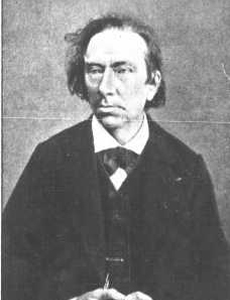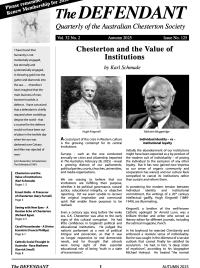
Ernest Hello was born in 1828, in France, almost 50 years before Gilbert Chesterton was born in England in 1874.
Despite these geographical and generational differences, Hello and Chesterton shared remarkable similarities. They were journalists, devout Catholics, sharply intelligent, superb essayists and shrewd critics of their age.
In addition, both men suffered chronic ill health. Fortunately, each had a devoted wife whose loving care extended her husband’s life—but without children.
Hello is almost unknown in the Anglosphere. Life, Science and Art has not been published in English, in a new edition, for over 100 years. The book deserves many readers, especially those weary of short-term answers that turn into long-term problems. In the third essay of this collection, ‘Intellectual Charity’, we read:
Now, written speech may be a great charity, and its diffusion, whenever it is true and beautiful, is one of the acts of charity most suited to our time. In many souls, a hunger and thirst exist which can only be satisfied by printed words. Between these eager readers and the writer (who should also be eager) a current of sublime charity may be established, since all give and all receive.
Hello understood that an accessible, engaging style attracted eager readers. He was sensitive to literature and art, writing in a manner that embedded timeless aphorisms in overlooked articles. Perhaps his journalistic training alerted him to the merit of brevity. Certainly, the pieces collected in this book have focused brevity—large ideas are encapsulated in, at most, five or six pages.
Generally, journalists emphasise temporal, profane matters to the exclusion of eternal, spiritual concerns. Hello and Chesterton are prominent exceptions to this rule. They critiqued their respective ages—epochs characterised by rapid technological changes and the abandonment of Judaeo-Christian values.
Both writers warned that this abandonment would create a society that was confused, irrational and unhappy— but fastidious about faddish values.
In France, Hello saw long-standing, functional religious customs, values and ideas dismantled to allow, supposedly, human flourishing under the rule of triumphant science and liberal politics. He disliked this aspect of his era, arguing that we were deluded if we thought temporal imperatives were more important than divine imperatives.
Hello’s Catholic perspective gives Life, Science and Art a prophetic quality, not by foretelling, but through forthright truth-telling. Robust truth excited Hello because it liberated us from confusion, slippery trends and manipulation’s half-truths.
He wrote, “to cure an evil we must look it in the face.” Hello looked various evils in the face, including indifference, envy, ignoring in-transigent reality to embrace fashionable ideas, and promoting mediocrity.
He pointed to the cure: the values provided by reality’s Creator. The quality of this cure has been demonstrated by the saints. Always, humanity has the Church and her saints, the invisible God and “severe reality” calling to us and guiding our life’s pilgrimage.
Receivers of truth, not constructors A post-modern pilgrim will benefit from Hello’s reminder that we are receivers of truth, not its constructors.
Our adventure in life, science and art—inclusive of every human activity—is to discover and explore the truth we encounter. The misadventure of imagining that we create truths is not given to us; it’s forbidden, condemned as pride’s attempt at a misguided autonomy. We are finite creatures in a universe not of our making and if we refuse to submit to the physical and spiritual truths we discover, we will not prosper. Instead, we will die frustrated and depressed.
A pilgrim artist will find encouragement. Hello considered Art an interweaving of Divine ideals, especially Beauty, with time and space. When Art is cheapened by ugliness or untruth it becomes tawdry and falsifying, and forgets the greatness of both Art and humanity. This forgetfulness, unfortunately, is widely evident across Western culture.
Life, Science and Art is filled with hope. Hope, Truth, Beauty, Art, Peace and Justice are not impersonal abstractions. Hello capitalised them because they’re Divine attributes of a Person: God, for Whom all things are possible.
Hello concluded his book with astonishing Hope for humanity:
Every human act, even the most impotent, loses its impotence when united to the Self-Existent. God grants to us, and even commands us to accept, the glorious productiveness of an activity united to His own. We act in Him, and our very work is repose in Him.
